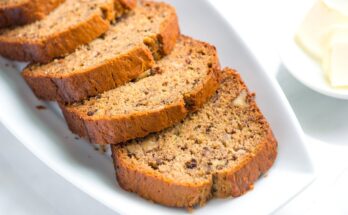Smoked Turkey Recipe: Smoking a turkey is an art that combines flavor, patience, and precision. If you’ve been looking for a way to take your holiday dinner or weekend barbecue to the next level, a perfectly smoked turkey could be your ticket to culinary stardom. Smoking not only enhances the natural flavors of the turkey but also creates a moist, tender, and unforgettable meal.
Whether it’s Thanksgiving, Christmas, or a casual family gathering, smoked turkey fits the bill. Plus, it’s healthier and less greasy than deep frying while still delivering incredible taste.
What You’ll Need
Essential Ingredients:
- A whole turkey (12–15 lbs)
- Olive oil or butter
- Your favorite dry rub or wet marinade
- Ingredients for brine (salt, sugar, herbs, spices)
Equipment Checklist:
- Smoker (electric, charcoal, or pellet)
- Meat thermometer
- Drip pan and foil
- Wood chips or pellets (e.g., hickory, apple, cherry)
Choosing the Right Wood for Flavor:
- Hickory for bold, smoky flavor
- Applewood for a hint of sweetness
- Cherrywood for a mild, fruity finish
- Mesquite for a more intense smoke flavor
Preparing the Turkey
- Selecting the Best Turkey: Opt for a fresh or thawed turkey between 12-15 pounds. Avoid pre-seasoned or self-basting turkeys, as they can interfere with the smoking process.
- Thawing and Cleaning: If using a frozen turkey, thaw it in the refrigerator (allow 24 hours for every 5 pounds). Clean the bird thoroughly by rinsing it under cold water and patting it dry with paper towels.
- Preparing the Cavity: Remove the giblets and neck from the cavity. Save them for gravy if desired, or discard them. Trim excess fat and skin from around the cavity for better smoking.
Brining the Turkey
Why Brine? Brining ensures the turkey stays moist and flavorful, counteracting the drying effects of long smoking times.
Ingredients for a Flavorful Brine:
- 1 gallon of water
- 1 cup kosher salt
- 1/2 cup sugar
- Fresh herbs (thyme, rosemary)
- Sliced citrus (lemons, oranges)
- Garlic cloves, crushed
How to Brine the Turkey:
- Mix all brine ingredients in a large pot or bucket.
- Submerge the turkey in the brine and refrigerate for 12-24 hours.
- Rinse the turkey thoroughly under cold water after brining to remove excess salt. Pat dry with paper towels.
Seasoning the Turkey
Dry Rub or Wet Marinade:
- Dry Rub: Combine paprika, garlic powder, onion powder, black pepper, and a hint of cayenne for a classic rub.
- Wet Marinade: Mix olive oil, lemon juice, garlic, and fresh herbs for a moist and aromatic base.
Application: Coat the turkey evenly, ensuring you get under the skin without tearing it. Don’t forget to season the cavity for a fully-flavored bird.
Preparing the Smoker
Choosing the Right Smoker:
- Electric smokers for ease and consistency
- Charcoal smokers for authentic smoky flavor
- Pellet smokers for a mix of convenience and taste
Setting Up the Smoker: Preheat the smoker to 225°F. Place a drip pan with water below the grate to maintain moisture. Add your choice of wood chips for the desired flavor.
Managing Temperature: Ensure the smoker maintains a steady temperature throughout the cooking process. Check every hour to replenish wood chips or adjust airflow.
Smoking the Turkey
The general rule is to smoke the turkey at 225°F for approximately 30 minutes per pound. Use a meat thermometer to monitor the internal temperature. The turkey is done when the thickest part of the breast reaches 165°F and the thigh reaches 175°F.
- Maintaining Moisture: Baste the turkey every hour with butter or apple juice for added moisture.
- Monitoring Progress: Avoid opening the smoker too often, as this releases heat and extends cooking time.
Resting the Turkey
- Why Resting is Crucial: After hours of smoking, the turkey needs to rest to allow the juices to redistribute. Skipping this step can result in a dry bird.
- How to Rest the Turkey Properly: Remove the turkey from the smoker and tent it loosely with aluminum foil. Let it rest for at least 30 minutes. This ensures the juices settle, making the meat tender and flavorful.
- Preventing Dryness During Carving: Resting also makes the turkey easier to carve, as the meat firms up slightly. Don’t rush this step, or you’ll lose valuable juices.
Carving the Smoked Turkey
Tools Needed for Carving:
- Sharp carving knife
- Cutting board with grooves for juices
- Serving platter for presentation
Step-by-Step Carving Guide:
- Remove the legs first by cutting at the joint between the thigh and the body.
- Separate the drumsticks from the thighs.
- Slice the breast meat into thin, even slices.
- Don’t forget to carve the wings for those who love crispy skin.
Presentation Tips for Serving: Arrange the slices neatly on a platter. Garnish with fresh herbs and slices of citrus for a professional-looking presentation.
Serving Suggestions
Best Side Dishes for Smoked Turkey:
- Classic Pairings: Mashed potatoes, cranberry sauce, and stuffing.
- Modern Twists: Roasted brussels sprouts with bacon, sweet potato casserole, or a tangy coleslaw.
Pairing Sauces and Gravies:
- Traditional turkey gravy made from drippings.
- A cranberry-orange sauce for a sweet and tangy contrast.
- Smoked paprika aioli for a unique smoky complement.
Wine and Beverage Recommendations:
- Red Wine: Pinot Noir or Zinfandel.
- White Wine: Chardonnay or Sauvignon Blanc.
- For non-alcoholic options, apple cider or sparkling water with lime is refreshing.
Tips for Perfect Smoked Turkey
Common Mistakes to Avoid:
- Skipping the brine, which leads to a dry turkey.
- Using too much wood, resulting in an overly smoky flavor.
- Opening the smoker too often, which disrupts the cooking process.
Advanced Tips for Expert-Level Smoking:
- Spatchcock the turkey (remove the backbone) for even cooking.
- Inject the turkey with flavored butter for extra moisture.
- Use a two-zone smoker setup to sear the skin for a crispy finish.
How to Store Leftovers Properly:
- Refrigerate leftover turkey in airtight containers within two hours of cooking.
- Reheat gently to avoid drying out, or use leftovers in soups, sandwiches, or casseroles.
FAQs about Smoked Turkey Recipe
1. What is the best type of wood for smoking a turkey?
The best woods for smoking turkey are mild options like apple, cherry, or pecan. These woods infuse the turkey with a subtle, sweet flavor without overpowering the natural taste of the meat.
2. How long does it take to smoke a turkey?
Smoking a turkey typically takes about 30 minutes per pound at 225°F. For a 12-pound turkey, this equals approximately 6 hours. Always use a meat thermometer to ensure the internal temperature reaches 165°F.
3. Should I brine the turkey before smoking?
Yes, brining enhances the flavor and ensures the turkey stays moist. A simple brine with water, salt, sugar, and spices works well. Brine the turkey for at least 12–24 hours before smoking.
4. Do I need to baste the turkey during smoking?
Basting is optional but can add extra flavor and keep the turkey skin crispy. If you choose to baste, do so sparingly to avoid losing heat from the smoker.
5. Can I smoke a turkey on a gas or electric smoker?
Absolutely! Both gas and electric smokers work well for smoking turkey. Just ensure consistent temperature control and add wood chips for flavor.
6. What seasonings work best for a smoked turkey?
Seasonings like garlic powder, onion powder, paprika, thyme, and rosemary complement the smoked flavor. Rub the turkey generously with the seasonings before smoking for a flavorful crust.
7. How do I store leftover smoked turkey?
Allow the smoked turkey to cool, then store it in airtight containers or wrap it in foil. Refrigerate for up to 4 days or freeze for up to 3 months.
8. Can I smoke a frozen turkey?
No, it’s unsafe to smoke a frozen turkey as it won’t cook evenly. Thaw the turkey completely in the refrigerator before smoking.
Conclusion
Smoking a turkey might take a little more effort than traditional roasting, but the results are well worth it. The deep, smoky flavor and tender, juicy meat are sure to impress your guests and leave them asking for seconds. Whether you’re a seasoned pitmaster or trying this technique for the first time, following this step-by-step guide ensures your smoked turkey turns out perfectly every time. Happy smoking!



